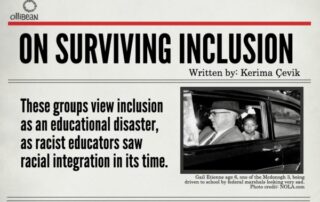Surviving Inclusion: At The Intersection of Minority, Disability and Resegregation
Kerima Çevik on Surviving Inclusion: At The Intersection of Minority, Disability and Resegregation “I see the work of inclusion as probably the last frontier of desegregation. If you read the brief from Brown v Board of Ed, The board of education argued that if we let the blacks be integrated then the next thing you know is that we’ll be letting people with disabilities be integrated.” Joe Petner, Principal, The Haggerty School, Including Samuel NAACP picketing St. Louis schools circa 1950s. Photo credit AARP In October of 2008, we discovered that our son, who was transferred into a full special education
On Surviving Inclusion
On Surviving Inclusion by Kerima Cevik Three young Black soldiers, bubbling over with the news that the Civil Rights act was just signed into law, and ready to demand a front door entrance and equal treatment everywhere rushed around places where people of color were formerly unseen and unheard. Image is of the first page of the Civil Rights Act of 1964. Credit National Archives. I cannot impart on you what this moment in time meant to them. Imagine being told all your life that you were less than others. Imagine approaching your local supermarket
The Reason I Blog
This blog (The Autism Wars), and all the other blogs and projects associated with it, are for my autistic son, Mustafa. But this blog is actually not talking about him without him or about daily life with him with some rare exceptions for times when his daily displays of empathy, kindness, and love towards me move me to write. When I say it is for my son, I mean it is part of my activism and my exploration of what it means to try and ally myself to his cause. This cause is something that too many of us are aware of
Creating Visuals Instantly for Unpredictable Activities
As an adult with autism, knowing what will happen during each day is important to me. For children, who have much less life experience, it is often a deal breaker in terms of them being able to participate in life around them. Using visual schedules supports this need both at school and on ordinary days at home, but what about those times when life gets hectic or when spontaneity is in order? Why Visuals Work Having an autism neurology means that neither internal regulation (physical, sensory, emotions) nor external regulation (making sense of the world around us) just happens! We



